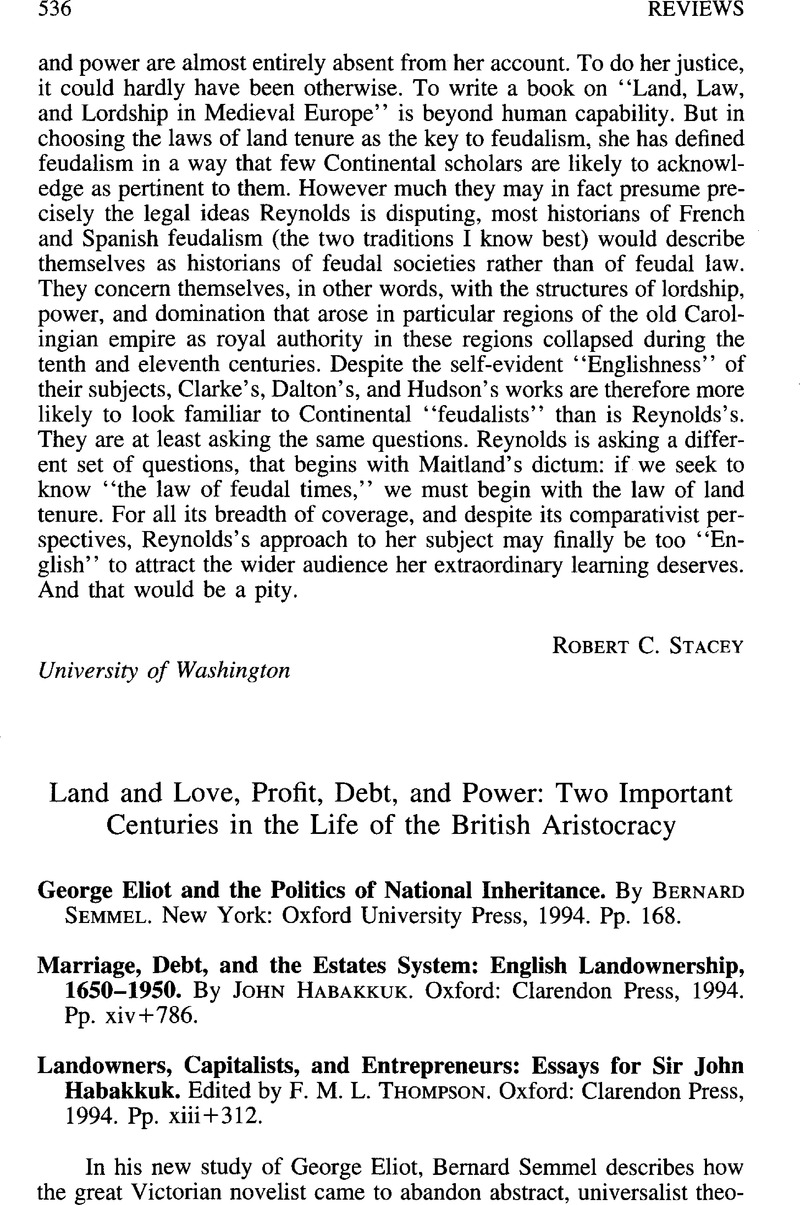No CrossRef data available.
Article contents
Land and Love, Profit, Debt, and Power: Two Important Centuries in the Life of the British Aristocracy - George Eliot and the Politics of National Inheritance. By Bernard Semmel. New York: Oxford University Press, 1994. Pp. 168. - Marriage, Debt, and the Estates System: English Landownership, 1650–1950. By John Habakkuk. Oxford: Clarendon Press, 1994. Pp. xiv+786. - Landowners, Capitalists, and Entrepreneurs: Essays for Sir John Habakkuk. Edited by F. M. L. Thompson. Oxford: Clarendon Press, 1994. Pp. xiii+312.
Published online by Cambridge University Press: 10 January 2014
Abstract

- Type
- Reviews
- Information
- Copyright
- Copyright © North American Conference of British Studies 1996
References
1 Thompson, F. M. L., English Landed Society in the Nineteenth Century (London, 1963), p. 68Google Scholar.
2 An excellent summary of Habakkuk's career and influence is provided by Thompson, F. M. L. in his introduction to Landowners, Capitalists, and Entrepreneurs (pp. 1–22Google Scholar).
3 Habakkuk refers mainly to Trumbach, Randolph, The Rise of the Egalitarian Family (New York, 1978)Google Scholar; and Stone, Lawrence, The Family, Sex and Marriage in England, 1500–1800 (Oxford, 1977)Google Scholar.
4 “The true explanation is more mundane: the rise in the portion in relation to the jointure was the result of the fall in the rate of interest” (p. 232). Habakkuk's discussion of changes in provision for aristocratic women would have been enriched by reference to Susan Staves's work, Married Women's Separate Property in England, 1660–1833 (Cambridge, Mass., 1990)Google Scholar.
5 Habakkuk cites Spring's, Eileen article, “The Family, Strict Settlement, and Historians,” Canadian Journal of History 18 (1983): 379–98CrossRefGoogle Scholar, which raised a number of objections to conclusions Habakkuk and Stone had reached on the implications of strict settlement for aristocratic widows, heiresses, and younger children. Apparently he did not have access to her important recent book, Law, Land, and Family: Aristocratic Inheritance in England, 1300–1800 (Chapel Hill, N.C., 1993)Google Scholar. For Randolph Trumbach's critique of that work, see Albion 26 (1994): 513CrossRefGoogle Scholar.
6 O'Brien, P. K. and Heath, D., “English and French Landowners, 1688–1789,” in Landowners, Capitalists, and Entrepreneurs (p. 24)Google Scholar.
7 Beckett, J. V., “The Decline of the Small Landowner in England and Wales 1660–1900,” in Landowners, Capitalists, and Entrepreneurs (pp. 89–112)Google Scholar. Beckett's, The Aristocracy in England, 1660–1914 (Oxford, 1986), pp. 58–66Google Scholar, provides a useful brief summary of points that Habakkuk develops in greater detail.
8 Stone, Lawrence and Stone, Jeanne Fawtier, An Open Elite? (Oxford, 1984)Google Scholar; Rubinstein, W. D., Men of Property (London, 1981)Google Scholar; Spring, Eileen and Spring, David, “The English Landed Elite, 1540–1879: A Review,” Albion 17 (1985): 149–66CrossRefGoogle Scholar; Thompson, F. M. L., “Business and Landed Elites in the Nineteenth Century,” in Landowners, Capitalists, and Entrepreneurs (pp. 139–71Google Scholar).
9 Thompson, , “Business and Landed Elites in the Nineteenth Century” (p. 165Google Scholar), refutes Rubinstein on this point. Habakkuk notes that the origins of these great fortunes changed, from profits of war and government service in the eighteenth century to manufacture and commerce in the Victorian era (p. 573).
10 “What English landowners accomplished within their rather favourable economic, legal, and geographical environment was not impressive,” they note in “English and French Landowners” (p. 62).
11 Cannadine, David, “Aristocratic Indebtedness in the Nineteenth Century,” in his Aspects of Aristocracy (New Haven, Conn., 1994), pp. 37–54CrossRefGoogle Scholar.
12 For the importance of these aspects of aristocratic behavior in creating “gentlemanly capitalism,” see Cain, P. J. and Hopkins, A.G., British Imperialism: Innovation and Expansion, 1688–1914 (London, 1993), p. 36Google Scholar.




